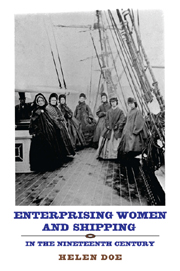Book contents
- Frontmatter
- Contents
- List of Tables and Figures
- List of Illustrations
- Dedication
- Acknowledgements
- Abbreviations
- Introduction
- 1 The Legal, Financial and Cultural Environment
- 2 Maritime Communities
- 3 Five Investor Ports
- 4 Shipowning Wives, Widows and Spinsters
- 5 Active and Passive Female Shipowners
- 6 Managing Owners
- 7 Port Businesswomen
- 8 Warship Builders
- 9 Merchant Shipbuilders
- 10 Conclusion: ‘A Respectable and Desirable Thing’
- Appendices
1 - The Legal, Financial and Cultural Environment
Published online by Cambridge University Press: 12 September 2012
- Frontmatter
- Contents
- List of Tables and Figures
- List of Illustrations
- Dedication
- Acknowledgements
- Abbreviations
- Introduction
- 1 The Legal, Financial and Cultural Environment
- 2 Maritime Communities
- 3 Five Investor Ports
- 4 Shipowning Wives, Widows and Spinsters
- 5 Active and Passive Female Shipowners
- 6 Managing Owners
- 7 Port Businesswomen
- 8 Warship Builders
- 9 Merchant Shipbuilders
- 10 Conclusion: ‘A Respectable and Desirable Thing’
- Appendices
Summary
The law relating to women and marriage became a subject of national debate in the nineteenth century, largely due to the concerns voiced by feminists in their pursuit of changes in the law, in particular as it affected divorce, rights over children and property. This brought the role of women sharply into focus, and government statistics, particularly the census, were used by proponents and opponents alike. The extent to which these changes helped or hindered the real position of women in society is a debatable topic amongst historians. Increasingly the view is that women and men used the law in any way they could to gain an advantage, and the maritime sector reflects this. This chapter examines three aspects of the national environment as it affected women investors and women in business. First, the legal framework, which was to change considerably over the period in question, from the Registration Act for Shipping in 1786, which provided a legal document for all shareholders, to the Married Women's Property Act in 1882 which finally gave all wives independent access to their property. Second, the financial environment also changed, with increased opportunities for investors in new joint stock companies and in new enterprises such as the railways. Third, some of the contemporary writers of the period reveal the contradictions in attitudes towards women investors and women in business.
The Legal Background: Wills, Wives and Wrecks
In 1835 the customs official in charge of the shipping register for Exeter made a note in the ledger relating to ownership of the 88-ton schooner, Dispatch. Sarah Barrett, a widow, owned 50 per cent of the ship, but sold her thirty-two shares to John Bennett ‘in trust for the benefit of the said Sarah Barrett and her children by her late husband, Thomas Barrett, the said Sarah Barrett being about to be married to James Hore of Topsham, mariner’.
- Type
- Chapter
- Information
- Publisher: Boydell & BrewerPrint publication year: 2009



